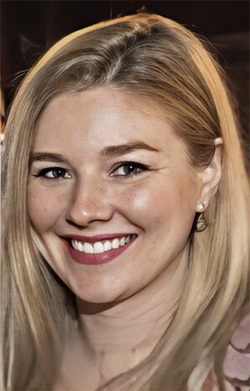Research Track residents can be mentored by members of the Vanderbilt Department of Psychiatry faculty as well as other departments in the Medical Center and across Vanderbilt University.
-

Erin Calipari, PhDDr. Calipari is an Associate Professor in the Department of Pharmacology and the Director of the Vanderbilt Center for Addiction Research. Her work focuses on understanding how drug use dysregulates systems in the brain to alter learning. Learning about environmental stimuli is a complex process controlled by a computational network of neural connections interacting with transcriptional and molecular mechanisms within each cell to precisely guide neuronal activity and behavior. The interplay between rapid, temporally specific neuronal activation and longer-term changes in transcription is of critical importance in the expression of appropriate or, in the case of disease, inappropriate behaviors. Together, her research seeks to understand how information is encoded in the brain. By integrating technologies that allow us to approach this question from the behavioral, circuit, local microcircuit, and molecular level we focus on understanding how adaptive and maladaptive processes in reward, motivation, and associative learning are regulated and dysregulated in disease.
Methodological Expertise: In vivo optical imaging in awake animals, RNA sequencing, epigenetic analysis, computational approaches to big data, drug addiction models
 Ashley Watts, PhD
Ashley Watts, PhDDr. Watts’ is a clinical psychologist research aims to understand the causes and consequences of mental illness (psychopathology), with a specific focus on addiction. Her research aims: 1) to improve how we classify various forms of mental illness, 2) to identify causes of mental illness and addiction, 3) to understand what contributes to overlap among addiction and other forms of psychopathology, and 4) to characterize risk profiles for substance involvement across the lifespan. To inform these topics, Dr. Watts draws on methods from a wide array of disciplines, including quantitative methods, behavioral and molecular genetics, psychometrics, psychiatric epidemiology, and developmental and adult psychopathology.
Her currently funded project aims to disentangle critical sources of alcohol use disorder’s heterogeneity by establishing consilience between human and preclinical models of addiction across multiple levels of analysis – phenotypic and genetic.
Methodological Expertise: advanced quantitative methods, genetics, psychometrics.
-

Dr. Albert is a PhD neuroscientist in the Vanderbilt Center for Cognitive Medicine. Her research focuses on systems approaches to understanding the neurobiological mechanisms underlying cognitive change and compensation in dementia and novel interventions to support healthy cognitive aging. Dr. Albert’s work has a particular interest in sensory processing and attention as primary functions that support learning, memory, and global cognition.
Methodological Expertise: structural and functional fMRI, EEG, cognitive assessment, experimental research
Dr. Andrews joined the Vanderbilt faculty in 2019 after completing her Geriatric Psychiatry Fellowship at the Indiana University School of Medicine. She is also a former Honors Scholar of the Geriatric Mental Health Foundation and board-certified psychiatrist from Einstein Medical Center, Philadelphia.
Dr. Andrews is a 2023 Scholar, which is a grant awarded by the Alzheimer’s Disease Neuroimaging Initiative (ADNI) to study how prior COVID-19 infection may accelerate cognitive decline in the ADNI cohort. She is Site Co-Principal Investigator for the Alzheimer’s Clinical Trials Consortium (ACTC) since Vanderbilt became an ACTC site in 2023. Dr. Andrews is the Site-Principal Investigator of the AHEAD Study, an NIA funded study of Lecanemab, a recently approved FDA treatment for Alzheimer’s Disease. Additionally, she is co-investigator in multiple NIH funded projects on cognitive impairment, geriatric depression, and dementia.
Methodological Expertise: Clinical trials in dementia
Vanderbilt Center for Cognitive Medicine
Vanderbilt Memory and Alzheimer's Center Paul Newhouse, MD
Paul Newhouse, MDDr. Newhouse is the Director of the Vanderbilt Center for Cognitive Medicine and co-Director of the Clinical Core for the Vanderbilt Alzheimer’s Disease Research Center. His research has focused on central cholinergic mechanisms in degenerative brain disorders and the role of cholinergic receptor systems in normal and disordered cognitive functioning in humans. He has also focused attention on the development of novel nicotinic agents for clinical use. Another major focus includes studying the interaction of estrogen and central cholinergic systems in relation to cognitive and emotional aging in the elderly and novel pharmacologic-imaging methodologies. His lab focuses on utilizing multimodal approaches to understanding brain function in aging including MRI imaging (structural and functional), PET imaging using molecular probes, EEG/ERP, and the development and testing of novel cognitive enhancing medication.
Methodological Expertise: Cognitive assessment, MRI/fMRI, PET imaging, Clinical trial design and implementation, Alzheimer’s disease therapeutics
Vanderbilt Center for Cognitive Medicine
Vanderbilt Memory and Alzheimer's Center Jo Ellen Wilson, MD, PhD, MPH
Jo Ellen Wilson, MD, PhD, MPHDr. Wilson is a consultation liaison psychiatrist (with a focus on geriatric psychiatry) and an epidemiologist with research projects spanning 3 research centers (Center for Cognitive Medicine; Center for Critical Illness, Brain Dysfunction and Survivorship; Vanderbilt Memory and Alzheimer’s Center). Dr. Wilson is the Principal Investigator of her prospective cohort of critically ill patients, the Delirium and Catatonia Prospective Cohort Investigation (DeCat), whose aim is to explore risk factors for catatonia, delirium and coma in the context of critical illness and to examine resulting morbidity (cognitive, psychological and functional measures) and mortality. Dr. Wilson is also the Principal Investigator of the Trial Ready Cohort for Down Syndrome (TRC-DS), as well as therapeutic trials to reduce the risk of developing Alzheimer’s Disease in Down Syndrome. Dr. Wilson leads several other projects using research, clinical and administrative datasets to explore research questions related to understanding cognitive trajectories in Alzheimer’s Disease, etc.
Dr. Wilson is submitting a grant proposal to examine whether cholinergic integrity is impaired in post-intensive care unit acquired dementia and is also interested in studying these mechanisms in long-COVID survivors.Methodological Expertise: epidemiology, cohort studies, clinical trials, neuroimaging, Alzheimer’s disease, delirium, catatonia, genetics
Vanderbilt Center for Cognitive Medicine
Critical Illness, Brain Dysfunction, and Survivorship Center
https//www.icudelirium.org/team/jo-ellen-wilson-md-mph
-

Dr. Corbett's research interests are in the area of stress, socioemotional functioning, puberty, sex and gender differences, and biobehavioral profiles in autism.
Methodological Expertise: translational research, physiological measures (cortisol, respiratory sinus arrhythmia), neuroimaging (fMRI, event-related potentials), naturalistic paradigms, peer mediation, novel therapeutic approaches
-
Meg Benningfield, MD, MSc
Dr. Benningfield is a child psychiatrist whose research interests focus on early intervention and prevention of mental illness with particular interest in anxiety disorders, trauma and stressor-related disorders, and substance use disorders.
Dr. Benningfield leads and collaborates on multiple NIH funded projects aimed at discovering the neurobiological roots of risk and resilience and developing new treatments for youth and families. Dr. Benningfield has also served as the PI for industry-sponsored clinical trials in adolescent depression.Currently funded projects that are enrolling participants at Vanderbilt include a study using EEG to better understand factors related to suicidal thoughts and behaviors in teens discharging from acute care, a clinical trial of a text-messaging intervention to support parents after their child is discharged from the emergency room, and work to improve screening for anxiety disorders in pediatric primary care.
Dr. Benningfield’s research training was supported by a NIDA-funded K12 through the American Academy for Child and Adolescent Psychiatry, and she completed a Master of Science in Clinical Investigation at Vanderbilt.
Methodological Expertise: clinical trials, task-based fMRI, screening measures for anxiety.
Medical Exploration of Neurodevelopmental Disorders (MEND) Clinic
-
 Colin Walsh, MD, MA
Colin Walsh, MD, MADr. Walsh is Associate Professor of Biomedical Informatics, Medicine, and Psychiatry at Vanderbilt University Medical Center. He is a practicing internist. He received a degree in Mechanical Engineering from Princeton University and his medical degree at the University of Chicago. He completed residency and chief residency in internal medicine at Columbia University Medical Center. He received a degree in Biomedical informatics in postdoctoral fellowship at Columbia University. He joined the faculty at Vanderbilt University in 2015. His research includes: 1) applied predictive modeling to enable behavioral health and prevention; 2) scalable phenotyping for precision medicine; and 3) population health informatics to combat the overdose crisis.
Methodological Expertise: Clinical informatics
-
 Thilo Womelsdorf, PhD
Thilo Womelsdorf, PhDDr. Thilo Womelsdorf is a Professor of Psychology and Biomedical Engineering studying higher cognitive functions (attention control) in nonhuman primates and humans using large-scale electrophysiological recordings, behavioral pharmacology and brain – computer interfaces (electrical and ultrasound neuromodulation).
Methodological Expertise: Nonhuman primate and human Systems Neuroscience, Behavioral Pharmacology, Fronto-striatal Electrophysiology, Brain Computer Interfaces, Reinforcement Learning Modeling
-
Warren Taylor, MD, MHSc
Dr. Taylor is a geriatric psychiatrist who studies the neurobiology of late-life depression, or depression in older adults. His current work is examining neurobiological differences that influence the development, persistence, and outcomes of depression. This includes longitudinal studies examining neurobehavioral factors contributing to depression relapse following remission, novel pharmacological interventions that engage key intrinsic brain networks, and experimental pharmacology studies probing the role of dopamine in depression characterized by cognitive or motor slowing.
Methodological Expertise section: Clinical trials, cohort studies, ecological assessments, magnetic resonance and PET imaging, clinical assessment of depression
Laboratory of Affective and Cognitive Imaging
-
 Laurie Cutting, PhD
Laurie Cutting, PhDDr. Cutting is Patricia and Rodes Hart Professor in Peabody College of Education and Human Development and holds secondary appointments in Radiology, Pediatrics, and Electrical and Computer Engineering at Vanderbilt University. She is also Associate Director of the Vanderbilt Kennedy Center, a member of the Vanderbilt Brain Institute, and training faculty for Vanderbilt’s Neuroscience Ph.D. program. Her work focuses on brain-behavior relations in children and adolescents, with a particular emphasis on academic and cognitive development. Currently, she is the principal investigator of several NIH- and other federally funded research projects examining the neural underpinnings of cognitive development, academic achievement, and learning. One of her more recent projects is examining the long-term effects of in utero substance exposure on cognitive and social outcomes. She received her training at Northwestern University and Johns Hopkins School of Medicine.
Methodological Expertise: Child development, cognition, neuroimaging.
 Kathryn Humphreys, PhD
Kathryn Humphreys, PhDDr. Humphreys is an Associate Professor of Psychology and Human Development at Vanderbilt University. She has a doctoral degree in clinical psychology at UCLA. She completed a predoctoral internship and postdoctoral fellowship in infant and early childhood mental health at Tulane University School of Medicine, and a second NIMH-funded postdoctoral fellowship in developmental neuroscience at Stanford University. Her research program includes both basic and applied work on development, adversity, and caregiving. Active projects include studying changes in brain during infancy as a function of the caregiving environment, ecological assessments of parent–child relationships and attachment security, and pregnancy-related brain changes using MRI and EEG.
Methodological Expertise: interviews; MRI; ecological assessments of children’s daily lives; longitudinal research
Stress and Early Adversity (SEA) Lab Autumn Kujawa, PhD
Autumn Kujawa, PhDAutumn Kujawa, Ph.D. is an Associate Professor in Psychology and Human Development at Vanderbilt University, a licensed clinical psychologist, and director of the Mood, Emotion, & Development Lab. She earned her Ph.D. from Stony Brook University and completed her clinical internship and postdoctoral fellowship in the neuroscience of mental health at the University of Illinois at Chicago. Dr. Kujawa's research aims to reduce the burden of mood disorders on youth and families. In particular, she takes a multi-method approach to examine how children and adolescents process and respond to emotion, the ways in which alterations in emotional processing contribute to the development of mood disorders, and how this knowledge can be translated to improve interventions.
Methodological expertise: EEG/ERP, psychophysiology, diagnostic interviews, stress interviews, cognitive behavioral interventions
-
 Carrie Fry, PhD
Carrie Fry, PhDDr. Fry is an assistant professor in the Department of Health Policy. Her work focuses on the impact of health reform measures – particularly in the Medicaid program – on health and social well-being. Her current research portfolio focuses on the intersection between health and social policy. She has ongoing research projects that evaluate coverage changes to the Medicaid program for people with mental health and substance use disorders using Medicaid claims data. Dr. Fry is the Tennessee PI for the Medicaid Outcomes Distributed Research Network (MODRN), a collaboration of 13 state/university partnerships geared toward improving quality of care and outcomes for Medicaid enrollees with substance use disorder. She’s also working on projects that explore the role of the legal system in the production of health for people under community supervision and returning to the community from jail/prison.
Methodological Expertise: secondary data analysis, including survey data and health care claims; observational and quasi-experimental designs; policy and program evaluation
-
 Lindsey McKernan, PhD, MPH
Lindsey McKernan, PhD, MPHDr. McKernan is a clinical psychologist who studies the intersection between co-occurring chronic conditions and mental health symptoms. Dr. McKernan is currently funded by the National Institute of Health to apply innovative psychosocial treatments for specific pain populations at VUMC. Recognizing that pain is a highly individual experience, the lab and its collaborators are administering tailored psychosocial interventions for urologic populations. The lab is also examining the relationship between emotional distress and health complaints. The lab's focus is to inform treatment and intervention delivery through applying patient-informed approaches to care, understanding unique patient-level factors that influence pain, and expanding treatments to a wider audience. Dr. McKernan has a collaborative lab, and welcomes conversations from those interested in the work.
Methodological Expertise: Clinical trials, quantitative sensory testing, patient-centered intervention design, qualitative investigation
McKernan Lab
X/Twitter: @LCMPhD
Instagram: @themckernanlab
-
Heather Burell Ward, MD
Dr. Ward is Director of Neuromodulation Research at Vanderbilt. Her lab uses neuromodulation (rTMS) and neuroimaging to understand and treat the brain-circuit basis of substance use and psychotic disorders. Dr. Ward is currently using individualized, network-targeted rTMS interventions for nicotine dependence. Dr. Ward is interested in developing rTMS interventions for substance use, cognitive impairment, and psychosis symptoms.
Methodological Expertise: Neuromodulation (rTMS), Neuroimaging, Clinical Trials
Ward Lab
Vanderbilt Psychiatric Neuroimaging Program
Vanderbilt Early Psychosis Program
-
 Christos Constantinids, PhD
Christos Constantinids, PhDDr. Constantinidis is a Professor of Biomedical Engineering, Neuroscience and Psychology (VU), and Ophthalmology, Radiology, and Neurosurgery (VUMC). His work focuses on the neural basis of cognitive functions, which he addresses with non-human primate models and intracranial recordings in humans.
Methodological Expertise: Working memory; neurophysiological recordings; prefrontal cortex
 Fiona Harrison, PhD
Fiona Harrison, PhDDr. Harrison is an Associate Professor in the Department of Medicine at Vanderbilt University Medical Center, specializing in neurodegeneration research. Her work primarily focuses on understanding modifiable risk factors that impact neurodevelopmental and neurodegenerative conditions, particularly Alzheimer's disease, using animal models. Dr. Harrison investigates the roles specific nutritional factors (especially vitamin C), environmental exposure to manganese and different models of illness and injury and how these impact neurotransmitter function and neuroinflammation. Dr. Harrison's approach bridges basic science with potential clinical applications and neuropharmacology.
Methodological Expertise: Animal models of neurodegenerative diseases, Behavioral phenotyping in animal models, Molecular and cellular neuroscience techniques to address neuroinflammation, oxidative stress, neurotransmitter function, Advanced imaging techniques, Pharmacological interventions in neurological conditions.
 Lisa Monteggia, PhD
Lisa Monteggia, PhDDr. Monteggia is the Lee E. Limbird Chair of Pharmacology and the Director of the Vanderbilt Brain Institute. Her research focuses on molecular and cellular mechanisms that underlie psychiatric disorders and their treatments. Her lab has investigated the role of neurotrophins, in particular brain-derived neurotrophic factor (BDNF), and the TrkB receptor in adult brain function in depression and antidepressant efficacy. She has also examined the rapid antidepressant action of ketamine and proposed an influential hypothesis that involves a specific intracellular signaling pathway and the identification of a novel form of homeostatic plasticity required for rapid antidepressant action. The Monteggia laboratory has also investigated the role of MeCP2 in synaptic function and behavior using mouse models of Rett syndrome. Within the laboratory we combine advanced molecular, cellular, behavioral, and electrophysiological studies to probe these scientific questions at multiple steps, and thereby establish causal links among diverse levels of analysis. These multi-based approaches are critical for understanding the brain, and yield insight into the pathophysiology and potential treatment of brain disorders.
Methodological Expertise: molecular/cellular biology; neuropharmacology; biochemistry; stress models; optical imaging; electrophysiology
-
Brandee Feola, PhD
Dr. Feola is a developmental scientist examining threat responses (stress, anxiety) across development and in people with psychosis. Dr. Feola’s research uses a multi-modal approach including neuroimaging (activation, connectivity), physiological (cortisol, heart rate, skin conductance), and behavior (clinician-rated and self-report measures). Dr. Feola is currently conducting a study to examine brain responses to threat in individuals with schizophrenia and how individual differences in threat responses relate to anxiety.
Methodological Expertise: Neuroimaging, Cortisol, Skin Conductance, Heart Rate
Vanderbilt Psychiatric Neuroimaging Program
Vanderbilt Early Psychosis Program Julia Sheffield, PhD
Julia Sheffield, PhDDr. Sheffield is a clinical psychologist studying delusions, interoception, decision-making, and treatment.
Methodological Expertise: Neuroimaging, Clinical Trials, Computational Psychiatry, Psychological Assessment
Vanderbilt Psychiatric Neuroimaging Program
Vanderbilt Early Psychosis Program Neil Woodward, PhD
Neil Woodward, PhDDr. Woodward studies the neural basis of psychotic disorders, primarily schizophrenia and bipolar disorder. Dr. Woodward uses neuroimaging and neuropsychological assessment approaches to address the following related aims: 1) Identify brain abnormalities in psychotic disorders; 2) Inform the neural basis of clinical symptoms and associated features; and 3) Improve neural models of psychosis. His work in psychotic disorders is embedded in a neurodevelopmental context and is complemented by research on characterizing brain development across the lifespan in healthy individuals, at-risk populations (e.g. psychosis spectrum youth), and people with neurodevelopmental disorders (e.g. autism).
Methodological Expertise: Neuropsychology, Neuroimaging
Woodward Lab
-
 Meredith Gruhn, PhD
Meredith Gruhn, PhDDr. Gruhn is a clinical psychologist. Her work focuses on the developmental consequences of early life adversity (ELA). Dr. Gruhn’s current study investigates stress responses in adolescents who have experienced early life adversity, including neural and physiological activation patterns, emotion regulation (ER) efforts, and ER flexibility. The long-term goal of this work is to inform, develop, and disseminate preventive interventions for youth following ELA.
Methodological Expertise: Physiology (skin conductance, respiratory sinus arrythmia, cortisol); neuroimaging; clinical interviewing; cognitive testing
-
- The Division of Child and Adolescent Psychiatry
- The Division of Addiction Psychiatry
- The Division of General Psychiatry
- The Division of Psychology
- The Division of Geriatric Psychiatry
- The Early Psychosis Program
- The Center for Cognitive Medicine
- The Psychiatric Neuroimaging Program
- The Vanderbilt Brain Institute
- The Department of Psychology
- The Department of Pharmacology
- The Department of Molecular Physiology and Biophysics
- The Vanderbilt Center for Addiction Research
- The Vanderbilt Kennedy Center